

We are pleased to announce a new, online edition of the NICAS colloquium on Thursday 14 April 2022 from 12.00 to 13.00 hrs. The colloquium will take place online through Microsoft Teams. By registering through the form below, you will receive the meeting link in your email.
Throughout the year, NICAS organises a bi-weekly Colloquium consisting of two short research lectures. It provides researchers with the opportunity to present ideas for, updates on or results of their activities. The NICAS Colloquium allows people to stay informed on a regular basis about the latest developments and results of research and to exchange information and expertise.
The chair of this colloquium will be Mitra Almasian (Rijksmuseum)
The presenters are:
► Kate van Lookeren Campagne – ‘The Proof is in the Pudding’: What can be learned from reconstructing 17th century Dutch tin-glazed tile recipes?
Abstract
The analysis and reconstruction of historical Dutch tin-glaze tile recipes can provide invaluable information on the raw materials used and their influence on features of historical tin-glazed tiles. Original potter’s books exist that not only document 16th and 17th century Dutch tin-glaze recipes but provide comments on the source of raw materials and production process. The results of the analysis and reconstruction of recipes have shown the significance of the fluxes used in the glazes as well as the porosity and calcium percentage of the ceramic. Furthermore, the process of reconstruction proved just as valuable in showing the kind of problems potters faced and how discrepancies could occur between the recipe and the final product.
Bio
Kate van Lookeren Campagne is a ceramic and glass conservator and lecturer at the UvA. She has worked as a conservator in London, Paris and the Netherlands and taught at the Opleiding Restauratoren, Instituut Collectie Nederland (now the RCE), and the UvA. She is currently completing a PhD entitled: ‘Understanding Dutch Tin-Glazed Tiles (1600-1750) Through the Interpretation of Texts, Analysis and Recipe Reconstruction,’ under the supervision of Maarten van Bommel (UvA) and Luc Megens (RCE).
► Katrien Keune – Operation Night Watch Symposium: Technical Innovations And Scientific Results
Abstract:
Over the course of the last 2.5 years Rembrandt’s Night Watch has been investigated with the most advanced research methods, computational and visualisation technologies. This week, from 11-14 April 2022, the Operation Night Watch online symposium will be held, focusing on the technological innovations and scientific results.
The symposium will present innovative approaches, research challenges, new insights and breakthroughs in our understanding of the use of materials, the composition of the paint and build-up and the condition of the painting. The research has been performed from the macro-to the nanoscale, in a non-invasive manner combined with micro-sampling. A wide range of scientific topics will be covered, including colour, chemical composition, degradation, texture, structural canvas analyses, cleaning studies, data fusion, visualisation tools and artificial intelligence. This NICAS presentation will give a summary of the symposium with highlights.
Bio:
Katrien Keune PhD, chemist, is head of Science at the Rijksmuseum Amsterdam and professor by special appointment of Molecular Spectroscopy at the University of Amsterdam, Netherlands. The Rijksmuseum science department focuses on three research themes, namely non-invasive imaging techniques, degradation studies and preventive conservation. Within Operation Night Watch, she leads and is responsible for the scientific research of The Night Watch. Her group at the University is specialized in chemical processes in heterogenous complex paint materials.